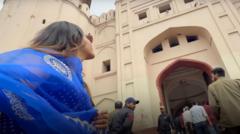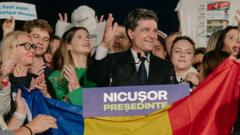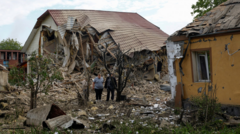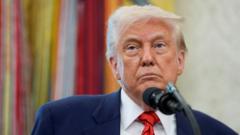**In an unprecedented response, Russian airports face chaos as Ukrainian drone attacks coincide with a declared ceasefire, resulting in significant diplomatic tensions.**
**Ukrainian Drone Attacks Leave Thousands Stranded at Russian Airports**

**Ukrainian Drone Attacks Leave Thousands Stranded at Russian Airports**
**Massive disruption continues as 60,000 passengers affected by flight cancellations following drone strikes.**
At least 60,000 air passengers are stranded across various airports in Russia, including Moscow, St Petersburg, and Sochi, following a large-scale drone attack attributed to Ukraine. The Russian travel agency, Ator, reports that 350 flights have been disrupted since Tuesday evening. As of now, there have been no reported casualties, but Russia’s defense ministry claims to have intercepted 524 Ukrainian drones in a single day—if confirmed, this would be an unprecedented figure.
In parallel developments, Ukraine reported that Russian air and missile strikes overnight had resulted in fatalities in Kyiv, including the deaths of a woman and her son. Amid these escalated tensions, the self-declared Russian ceasefire is set to coincide with preparations for the annual World War II victory parade on May 9, a truce that Ukraine dismissed as disingenuous.
US Vice-President JD Vance characterized Russia’s demands as excessive and emphasized the necessity for dialogue between the two nations, suggesting a shift in the American position towards Russia. Vance noted the importance of unity between the US and Europe but did not exhibit optimism regarding Russia's willingness to negotiate in good faith.
Disruption in travel remains severe, particularly in Moscow’s three main airports: Vnukovo, Sheremetyevo, and Domodedovo, where a significant number of flights have halted. Reports emerged of lengthy queues and passengers waiting for hours to deplane upon arrival. Cities such as St Petersburg and Sochi also reported substantial delays or cancellations.
Coinciding with the chaos, Chinese President Xi Jinping is scheduled to attend the victory parade in Moscow. However, his arrival complicates matters, as some leaders planning to attend have faced challenges due to Lithuanian and Latvian airspace restrictions for Russian flights. Slovak Prime Minister Robert Fico expressed frustration over similar barriers imposed by Estonia.
The Kremlin’s public refusal to budge on pre-conditions for negotiations, viewed by many as a strategy to extend the conflict, continues to draw criticism from Ukraine and its allies. As the ceasefire begins, President Zelensky reaffirmed the need for heightened pressure on Russia, warning against potential provocations during the upcoming commemorations.
In a broader context, the significance of Victory Day celebrations in Russia—marking the fall of Nazi Germany—has become a narrative backdrop for President Putin’s ongoing military campaign in Ukraine. While Moscow views the event as a symbol of national pride, Ukraine and European nations see it as an affront amid ongoing hostilities, further muddying the prospects for peace. On the other hand, some viewed the potential for dialogue as a pathway forward, emphasizing the importance of establishing a framework for negotiations.



















